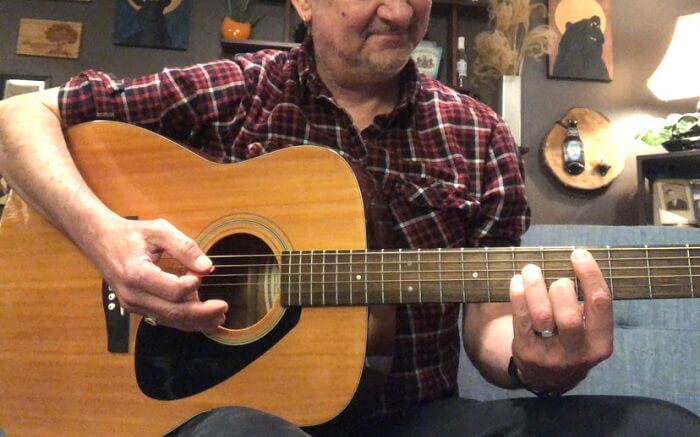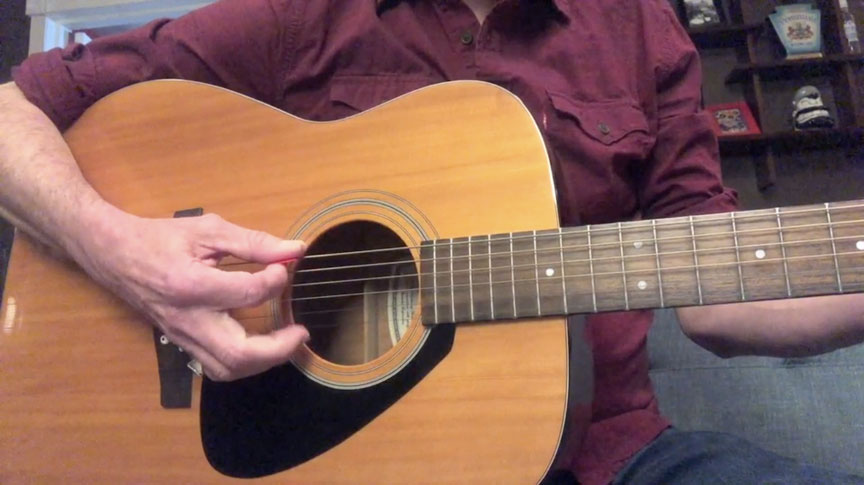How to Clean Your Guitar in 6 Easy Steps
This page contains affiliate links. We may earn money or products from the companies mentioned in this post through our independently chosen links, which earn us a commission. Learn More
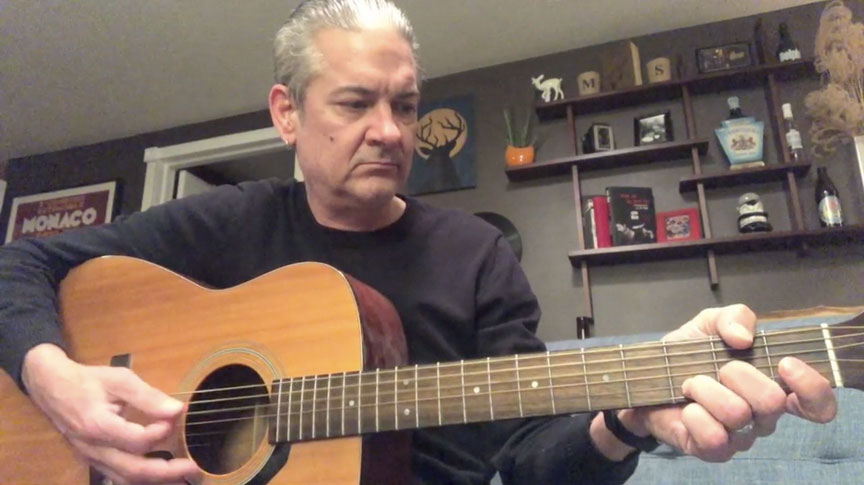
The simple truth is, the more you play, the dirtier your guitar is going to get due to the natural oils and sweat that are transferred from your hands. Also, dust build-up is a natural, unavoidable occurrence that accumulates the longer you have your guitar out of its case.
However, there are a few simple steps that you can take that, if done correctly and on a regular basis, will keep your guitar looking, playing and sounding its best. Whether you play daily, weekly or monthly, following these simple cleaning tips before and after you play will definitely improve your playing experience.
What's Here
Why You Should Trust This Review?
I’ve been playing guitar and making music for approximately 35 years, mostly based out of Los Angeles, CA. I’ve played in several bands, been involved with several recording projects and played countless shows all over the world.
As a band member I have been a leader, a follower and a team player, primarily playing punk and alternative styles of music. I’ve never taken a formal guitar lesson but I have learned a lot from other musicians by simply playing along with them, asking questions and picking up tips and tricks here and there.
I continue to enjoy the experiences I get from playing and touring, and a big part of that is because I’m still able to learn so much from other guitar players.
Guitar Cleaning at a Glance: What Parts to Clean
- Neck
The front (fretboard) and back of a guitar neck must be cleaned often to remove oils and sweat.
- Strings
Strings capture the natural oils and sweat from your fingers and need to be cleaned and even changed regularly.
- Body
Keeping the body of a guitar clean will prevent stains and gunky buildup that result from playing.
- Tuning Pegs
The tuning pegs can accumulate lots of dust and, if not cleaned, can make tuning more difficult.
- Clean Hands
Properly washed hands will make playing easier and help to keep your guitar more clean in the long run.
- Storage
Keeping your guitar in its case will help to prevent a build-up of dust, as well as protecting it from accidental damage.
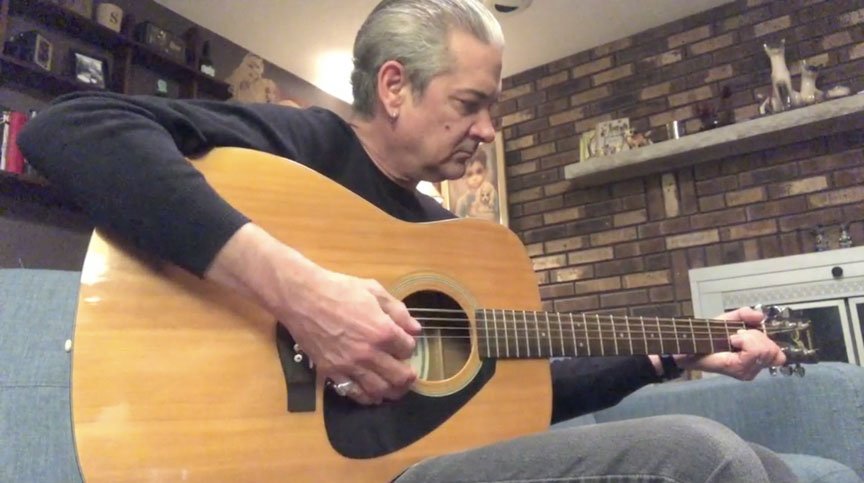
Things To Keep In Mind When Cleaning A Guitar
In this article, we’ll expand on some of the basics when it comes to keeping your guitar clean. Many of the products you will need are things that you may already have in your home, and what you don’t have can be easily found at a music store or online at a very low cost.
Cleaning The Neck Of Your Guitar
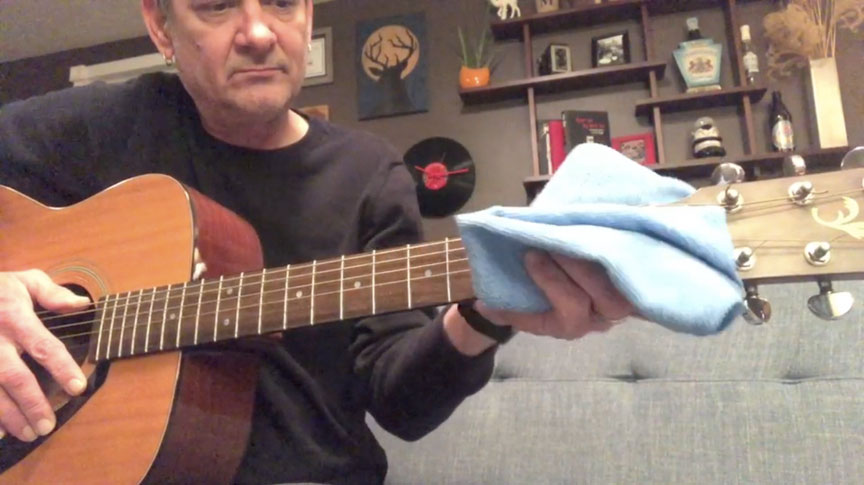
The neck of your guitar tends to get the most amount of physical contact from pressing down on the strings and moving your hand up and down the fretboard. So, the neck is probably the dirtiest part of your guitar that requires the most attention. And, the more you play, the dirtier the neck is going to get.
Before you play, use a clean microfiber or lint-free cloth to quickly wipe down both sides of the neck to get rid of any dust, oil or sweat that may have developed from the last time you played. And, when you’re done playing, be sure to wipe down both sides of the neck to remove all of that oil and sweat that accumulated.
Keeping Your Strings Clean
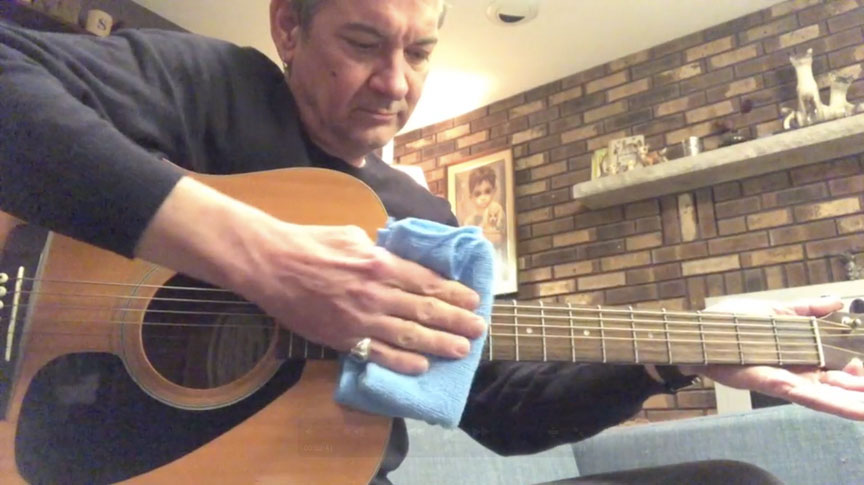
Guitar strings are basically tightly wound cables or springs; meaning that they have grooves that collect every little bit of dust, oil and sweat whenever you touch them. And, the more you touch them, the dirtier they get, and the more difficult they can be to play.
If guitar strings develop too much gunk in their grooves, it will become more difficult for you to move your hands up and down the fretboard. And, gunky strings just don’t sound good. But, if you wipe down your strings with a clean cloth after you play to remove all of that extra grimy buildup, your strings will maintain their brightness, making it easier to play and give your guitar better, brighter tones.
Cleaning The Body Of Your Guitar
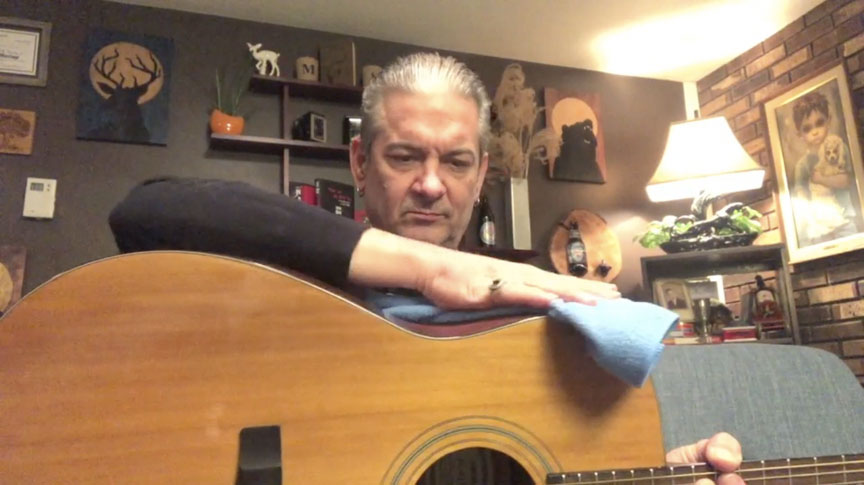
Keeping the body of your guitar clean may not seem that important, but if it’s dirty, it can make it more difficult for you to move your strumming arm around, which can make it harder for you to play. Also, a dirty guitar simply doesn’t look good when you’re playing in front of an audience.
The inner part of your strumming arm produces a lot of natural oil and sweat, just like your hands do on the fretboard. But, if you spray on a guitar cleaner or guitar polish, and then wipe it down with a microfiber or lint-free cloth before and after you play, it will definitely make your playing better and preserve the finish of your guitar’s body. And, don’t forget to clean the back of your guitar, too!
Keeping Your Tuning Pegs Clean
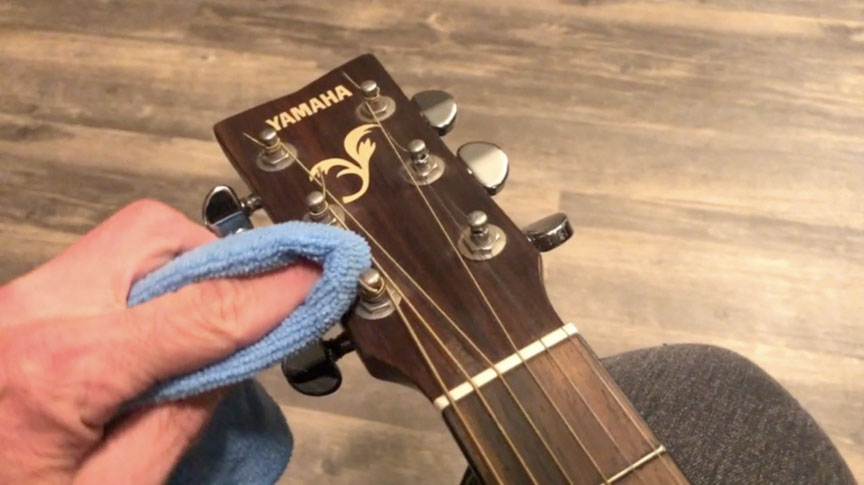
Keeping your guitar in tune is a vital part of playing, which means that you’ll have to tighten and/or loosen your tuning pegs before you play. The ends of your strings that are wrapped around your tuning pegs may not have to deal with as much movement or vibration like on the neck of our guitar, but your tuning pegs can still accumulate dust and other debris, which can affect the way that your guitar sounds.
However, using a dust-free cloth or a soft dusting brush on your tuning pegs before and after you play will help to preserve your strings, along with helping to keep them in tune. It only takes a minute but it can make a huge difference. Also, if your tuning pegs are clean, it’s another thing that helps to keep your guitar looking great.
Washing Your Hands

It seems like a simple task and one that we all do several times a day, but the cleaner your hands are, the cleaner your guitar will be. Your hands and fingers produce a lot of natural oils and sweat, so if you pick up your guitar and start playing before washing your hands, you’re going to transfer all of that grime onto your guitar, which will only create more cleaning work for you to do later.
So, when you get the urge to play, make it a habit to thoroughly wash your hands and make sure that are completely dry. Also, you’ll find that the cleaner your hands are, the easier it will be for you to play in the first place.
Storing Your Guitar

Guitars are very attractive-looking instruments and they look great when you have them on display around your home. But the longer you keep them out of their cases, the dirtier they are going to get due to dust, dirt and debris that naturally float around in the air. Also, keep in mind that guitars are mostly made of wood and are very much affected by things like humidity, aridness and changes in temperature.
So, keeping your guitar in a solid, airtight case is a great way to prevent the wood from warping or decaying, and a case will also help to prevent the metal hardware from getting rusty. Lastly, be sure to store your guitar inside of your home and not in your garage or attic. The insides of homes have more regulated temperatures, which will help to maintain your guitar’s longevity.
Final Thoughts
Playing the guitar can be a wonderful experience, but if your guitar is not properly kept clean, it can become more difficult to play. And, the dirtier your guitar is, the less enjoyment you will get out of playing it in the first place.
But, if you follow a few, simple steps when it comes to cleanliness, you will not only have a better playing experience, but your guitar will sound better and last longer. So, keep it clean, and enjoy your playing!

